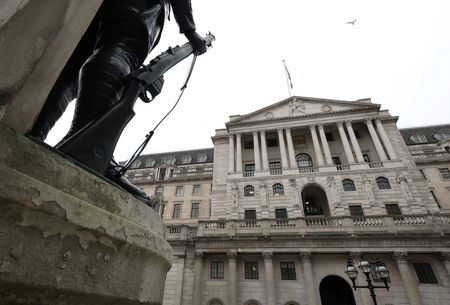By David Milliken
LONDON (Reuters) – Bank of England policymaker Catherine Mann said on Tuesday that her unexpected vote for a half percentage-point cut in interest rates last week did not mean she wanted a series of rate cuts or that she would vote the same way again in March.
Mann’s vote came as a surprise to investors, who she said had viewed her as an “uber-hawk”, though her approach was better understood as one of “activism”, unlike the gradualism favoured by most of the BoE’s Monetary Policy Committee.
In a speech on Tuesday, she said she still viewed restrictive monetary policy as necessary and saw the long-term equilibrium level of British interest rates at the higher end of a 3.0-3.5% range given by a BoE survey of investors.
Her position contrasts with that of Swati Dhingra – the other Monetary Policy Committee member who voted for a 50 basis-point cut – who has consistently voted for looser policy.
“Active doesn’t mean cut, cut, cut,” Mann said in a question and answer session after a speech at Leeds Beckett University in northern England.
Mann said she had voted to keep rates on hold until now because of persistent weaknesses in Britain’s economy that acted to push up inflation.
“Those structural impediments continue to be in evidence in this economy, and so the notion that somehow (I support) ’50 now, 50 next time’ – that would not be a full reading of what I have just said.”
Nonetheless, Mann judged that sufficient evidence had built up of soft consumer demand, the risk of a sharp deterioration in the labour market and weakening corporate pricing power for her to drop her opposition to cutting rates.
Voting for a half-point cut was the clearest way to signal this to financial markets, she said.
“I chose 50 basis points now, along with continued restrictiveness in the future, and a higher long-term Bank Rate to ‘cut through the noise’,” she added, saying she rejected the gradualist approach preferred by most policymakers.
Last week the BoE halved its growth forecast for 2025 to 0.75% but also forecast inflation would rise from 2.5% in December 2024 to around 3.7% by the third quarter of this year.
Mann said her commitment to continued ‘restrictiveness’ in interest rates “ensures that, as we move through the inflation hump, (inflation) expectations remain anchored both in the near and longer term”.
(Additional reporting by Suban Abdulla; Editing by William Schomberg, Andy Bruce and Hugh Lawson)










